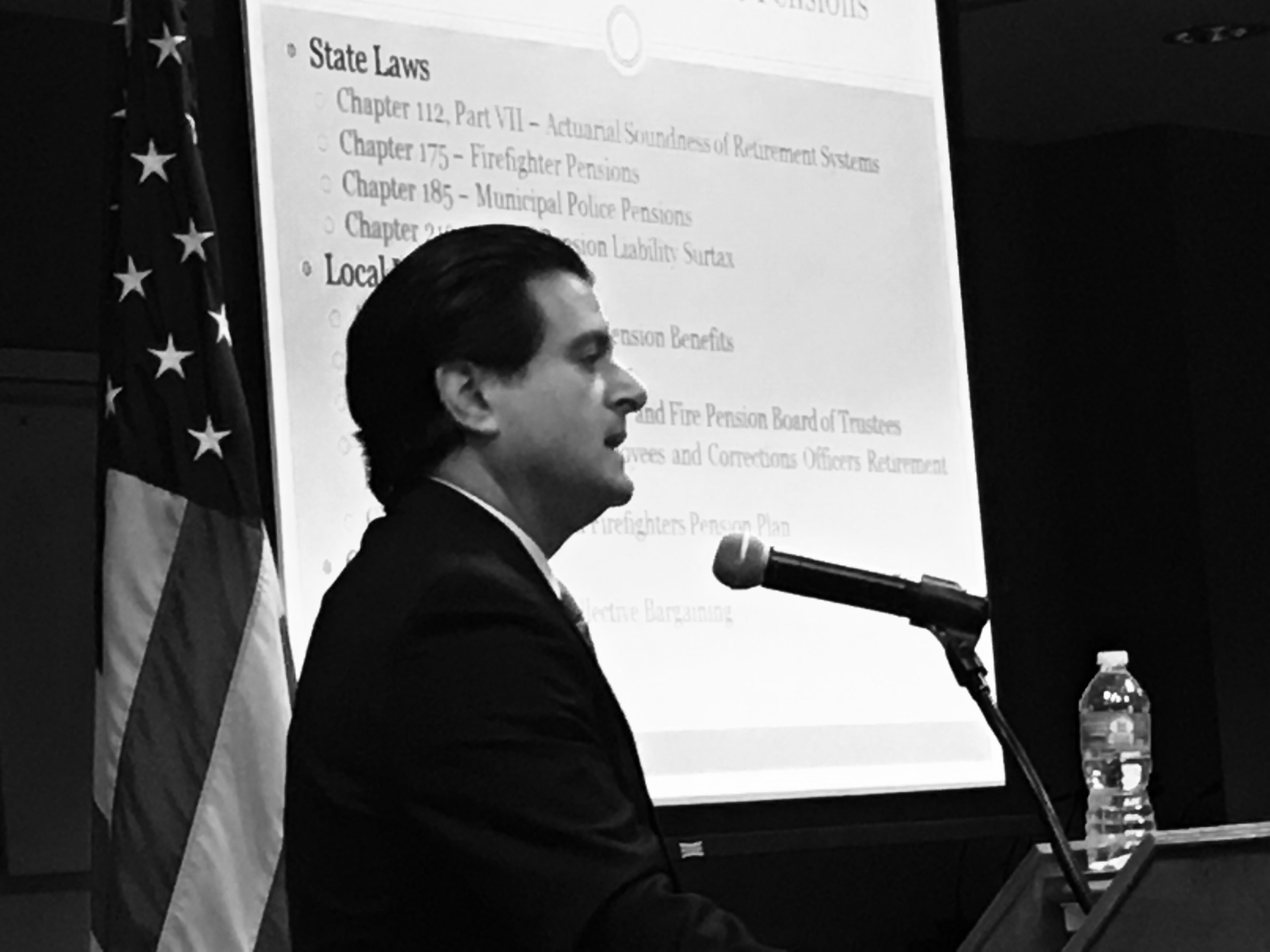
A Monday “lunch and learn” of the Jacksonville City Council involved members getting educated on the finer points of collective bargaining.
Not a moment too soon for that, as the council will have to vote later this spring on whether or not to ratify the latest pension reform package from the mayor’s office via 11 different ordinances: five on the city side, five from JEA side, and one from police and fire.
Introduction of legislation is imminent, with a slew of collective bargaining agreements being advanced to the council this week — potentially as soon as Tuesday.
The best deals are for police and fire, of course.
The deal offers long-delayed raises to current public safety employees (a 3 percent lump sum payout immediately, and a 20 percent raise for police and fire over three years) and gives all classes of current employees the same benefits.
As well, all police and fire officers will have DROP eligibility with an 8.4 percent annual rate of return and a 3 percent COLA.
The deal, if approved without modification, will bring labor peace through 2027 — though it can be renegotiated by the city or the unions at 3, 6, 9, and 10 years marks in the agreement.
For new employees, however, the plan is historic — a defined contribution plan that vests three years after the new employee for police and fire is hired.
The public sector unions have agreed to this, but the council’s approval is necessary — and not to be taken for granted.
“As of Friday, all the bargaining units have ratified” the deals, General Counsel Jason Gabriel said, including the general employees — an important part of the puzzle, as all plans have to be closed before the funds are available, either to access or to provide certainty to actuaries that the money will be there.
_____
In March 2015, for example, the council deadlocked 9-9 on a reform vote. Though objections were magically mooted weeks after Alvin Brown lost his re-election, the fact remains that council needs to understand the process.
To that end, General Counsel Jason Gabriel — an integral part of the negotiating process — explained recent history on concepts to council, which saw 11 new members since the last pension reform package was approved.
Gabriel referenced the “unorthodox” way the city had of negotiating these terms in the past, but those days are long gone now.
“There’s been a conflation of roles … when it’s come to collective bargaining in general,” Gabriel said.
The council, said Gabriel, will have its “management hats” on when deciding to approve or deny the deal.
Gabriel described the 2015 “settlement agreement” as putting the “final kibosh” on negotiating with the Police and Fire Pension Fund, paving the way for the various pension reform deals negotiated since August 2016 with the unions.
The city has three funds: the general employees fund, the correctional officers fund, and the police and fire pension fund.
These funds were established in 1937; pending ratification of pension reform by the council, they will be closed to new members.
____
Gabriel went back into history: starting a granular analysis in the early 1990s, after some changes in the 1980s led to a city charter amendment that made the police and fire pension fund an independent agency of the city.
The Ed Austin administration imposed an amendment allowing the local PFPF to negotiate pension benefits, and amendments over the years and across administrations changed and elongated the deal, leading to the 2001 “30-year agreement.”
Gabriel reviewed lawsuits related to that agreement, including actions related to violation of agreement terms, Sunshine Law violations, and so on.
Gabriel discussed pension reform deals worked out by the John Peyton administration in 2011, but not approved, as the Alvin Brown administration withdrew the bill related to the police and fire pension fund.
“The Peyton plan kind of comes off the table, and we start fresh with the Brown administration,” Gabriel summarized.
The Brown administration attempted legislation related to a mediated settlement of a sunshine law suit in 2013, a 2014 retirement reform agreement, and a counter-proposal from the PFPF in 2015, but finding common ground between the council, the mayor’s office, and the pension fund proved challenging.
Also attempted: making JEA a funding source. That didn’t float either.
The 2015 agreement that was ratified, said Gabriel, had “two huge provisions.”
One: “that collective bargaining is a constitutional right of the unions and management … and those rights are not waivable.”
“Everything we’re doing today fits into the terms of the 2015 agreement,” Gabriel said, referring to the pension reform package put forth by the Curry administration, one that sees dedicated funding coming from the extension of a current sales surtax.
“None of this is easy,” Gabriel said, referring to the stipulations of the plan, which include closing underfunded plans to new employees, agreeing to a 10 percent minimum employees contribution, an extant surtax with a date certain for termination, and keeping the trustees out of the bargaining.
“It’s almost like a sleeper provision in there,” Gabriel chortled about the latter. “It’s crystal-clear … we have to follow the dictates of the statute, and one of them is that the board of trustees has no role in pension benefits.”
____
If legislation is completed and ready to be filed, the bills will be added to the addendum council agenda meeting Tuesday, setting up a more robust schedule of meetings.
“It’s all a moving target,” Council President Lori Boyer said, with the hope for a marathon meeting about the “financial side” between representatives of the mayor’s office and city council on Apr. 6.
“I’ll hand out a whole schedule tomorrow of potential dates,” Boyer said, floating the possibility of taking up these issues in a separate meeting dedicated to the purpose of pension reform, pending the distribution of actuarial studies.
“This meeting is about us receiving the information … we don’t even have it yet,” Boyer said.



